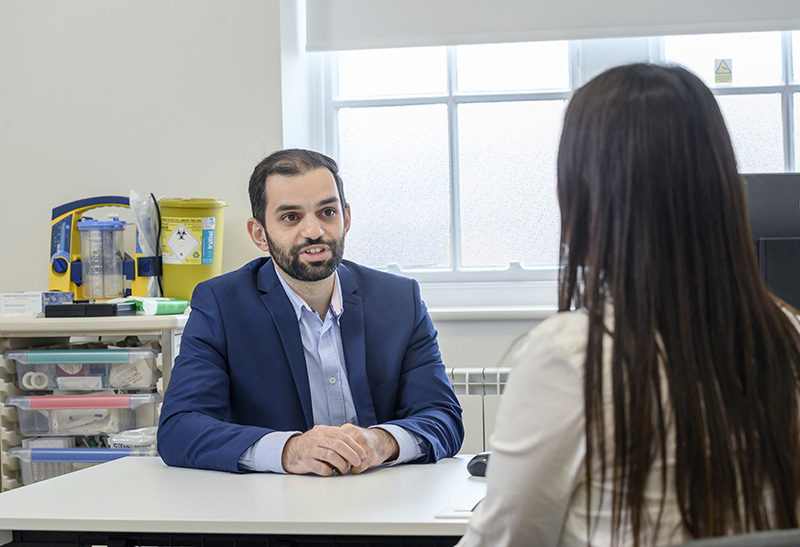Contents
Scoliosis

Scoliosis refers to an abnormal sideways curvature of the spine, often developing during periods of rapid growth such as adolescence. In some cases, it may progress into adulthood and lead to discomfort, limited mobility, or postural issues. Early detection and appropriate treatment are key to managing this condition effectively.
At The New Foscote Hospital in Banbury, our multidisciplinary team of spinal consultants and physiotherapists provide comprehensive assessment, diagnosis, and both surgical and non-surgical treatment for scoliosis in patients of all ages.
Symptoms of Scoliosis
Signs of scoliosis can vary depending on the degree and type of spinal curvature. Common symptoms include:
- Uneven shoulders or hips
- One shoulder blade appearing more prominent than the other
- Visible curvature of the spine
- Uneven waistline or leaning to one side
- Back pain, particularly in adult patients
- Reduced range of movement or stiffness
- In severe cases, shortness of breath due to reduced lung capacity
These symptoms may be subtle in mild cases but should be investigated promptly, particularly in children and adolescents.
Causes and Types of Scoliosis
Scoliosis can occur for a variety of reasons, and understanding the underlying cause helps guide treatment.
- Idiopathic Scoliosis
This is the most common type, particularly in adolescents, and usually develops during growth spurts. The exact cause is unknown. - Congenital Scoliosis
Caused by a malformation of the spine present at birth. - Neuromuscular Scoliosis
Associated with conditions such as cerebral palsy, muscular dystrophy, or spinal muscular atrophy. - Degenerative Scoliosis
Occurs in adults as a result of spinal degeneration, disc wear, or osteoporosis. - Functional Scoliosis
A temporary curve caused by differences in leg length, muscle spasms, or posture. The spine itself remains structurally normal.
Diagnosis at The New Foscote Hospital
If scoliosis is suspected, a detailed clinical examination and imaging are required to confirm the diagnosis and determine the degree of spinal curvature (measured by the Cobb angle). We offer:
- Consultant-led physical assessment
- On-site X-rays and MRI scanning
- Postural and flexibility evaluation
- Forward bend test (Adam’s test)
We provide rapid access to diagnostics and results to ensure timely and accurate treatment planning.
Treatment Options
Treatment is tailored based on the severity of the curve, symptoms, age of the patient, and likelihood of progression.
Non-Surgical Management
- Pain Management: Medication and physical therapy may be used in adults to relieve discomfort associated with degenerative scoliosis
- Observation: For mild curves, particularly in growing adolescents, with regular monitoring.
- Physiotherapy: Customised exercise programmes to strengthen the core, improve posture, and reduce discomfort.
- Bracing: A spinal brace may be recommended for growing children to prevent progression of the curve.
Surgical Treatment
Surgery may be considered when the spinal curve is severe (typically over 45–50 degrees), worsening, or causing functional issues. Procedures include:
- Spinal fusion surgery: To correct the curve and stabilise the spine.
- Minimally invasive techniques: Available in appropriate cases to reduce recovery time and post-operative discomfort.
All surgical treatment is carried out by our highly experienced consultant spinal surgeons.

Book an Appointment
If you’re experiencing symptoms of a ligament injury, don’t delay diagnosis and treatment. Contact The New Foscote Hospital in Banbury to arrange a consultation with our orthopaedic specialists.
18 June 2025



